A botanist’s photographs go online
The Old Library is a repository not only of written words, but also of fascinating pictures. The donation of the papers of R.H. Yapp, Professor of Botany, has added over 700 early glass plate negatives and a new dimension to our photographic collections. Yapp entered St John’s in 1895 to study Natural Sciences and was appointed Botanist to the 1899-1900 University expedition to the Siamese Malay States. A keen amateur photographer, he took his camera with him, capturing not just plant life, but local scenes, people, and wildlife. He travelled to Switzerland and Italy in 1903, and to South Africa two years later. He also kept detailed photographic records of his ecological studies in the Fens and the North Wales salt marshes, with which he illustrated his scientific papers.
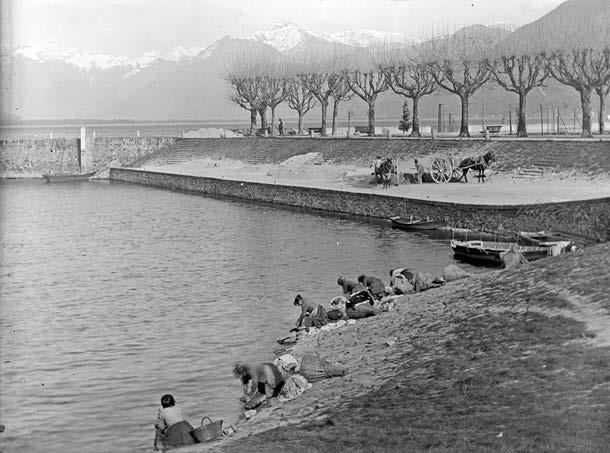
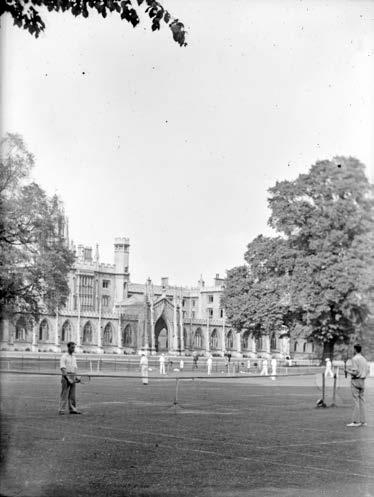
A generous donation from Yapp’s grandson, who gave us the collection, has enabled us to digitis e all these fragile negatives. Glass plates deteriorate over time, even if kept in perfect conservation conditions. Digitising isn’t just for preservation; it enables us to make these images publicly available to a much wider audience via the Cambridge Digital Library (https://cudl.lib.cam.ac.uk/). Such a project is no small undertaking. Metadata had to be created for each individual image. Yapp helpfully labelled most of his photos, but deciphering botanical names (some of which have changed in the last 100+ years) and obscure place names, all in tiny handwriting, was a challenge. Then the negatives travelled to Ely to the FSB Scanning Bureau at the Cambridgeshire Archives, where specialist staff with experience of digitising fragile historic materials scanned them all at high resolution. The digital images then went

Li b r a r y N e w s l e t t er L
St John’s C olle g e
Easter 2023
Above:
VOLUME 6, ISSUE 3 SJC-IT-07 Locarno, Switzerland. Women washing clothes. (1903)
SJC-C-12 Tennis on St John’s Paddock, May Term. (1899)
to the UL, complete with metadata downloaded from our archival catalogue. After checking on a test server, they will be loaded onto CUDL, aiming to go live in June. We’re thrilled to be able to make this collection available online, as a research resource for current botanists, ecologists, and historians of science, and giving the wider public a fascinating insight into diverse locations and their vegetation a century ago. Yapp’s South African diary and some of his letters home describing his travels will be added to CUDL later this year, once we have scanned and created metadata for those too. Cataloguing is still ongoing.
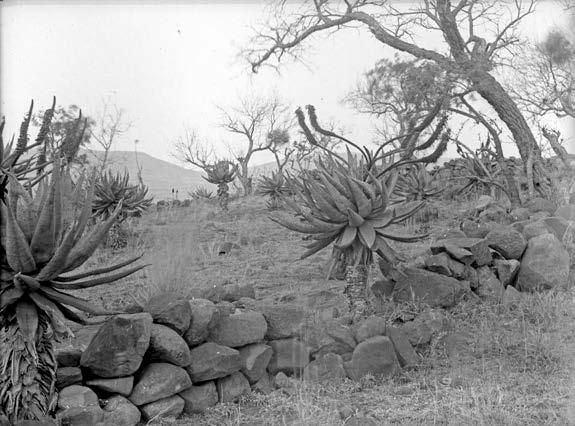
Archives celebrate women’s influence
Visitors to the Archives Centre now have two new information banners to read in breaks from perusing the manuscripts they’ve come to view. Paid for with money from the College’s annual fund, the banners take the place of more traditional display boards, which could not be attached to the walls of the mediaeval School of Pythagoras, home of the Archives Centre. In a format described as ‘pop-up’ (although the manoeuvre is not as easy as it sounds!), they can be taken down and put up elsewhere on site as temporary display items at College events, and one has already been used in this way.
Inspired by the anniversary of the admission of women undergraduates, both banners look at ways in which women have contributed to the College since its foundation. One banner is on the subject of Lady Margaret
Beaufort; the other concerns early (sixteenth- and seventeenthcentury) benefactors of the College. Administrative papers concerning Lady Margaret’s household, estates, and to an extent her family, are held in the institutional archives, as are iterations of her will, the College’s Foundation Charter, and the deeds by which
the Lady Margaret Professorship and Lady Margaret Preachership at the University were founded. Documents concerning benefactions to the College include indentures of agreement for donations of land to the College, from the profits of which Scholarships and Fellowships were funded. Written on parchment and sealed with the red wax seals of the parties involved (in one case, eleven seals are appended), twentyfive of these indentures date to the sixteenth century. One is for the foundation of a Fellowship by Dame Joan Rokeby (1524); another is for the sale of land by Lady Mildred Burghley in order to fund two Scholarships (1579), although Lady Mildred did not wish this act of charitable giving to be made public and arranged for the gift to be made by her friend, the Dean of Westminster.
An expanded version of the text of the banner concerning Lady Margaret Beaufort is available on the Archives Centre webpage (https://www.joh.cam.ac.uk/lady-margaret-beaufort-dominafundatrix ), and an online exhibition based on the early benefactors’ banner will follow in due course.
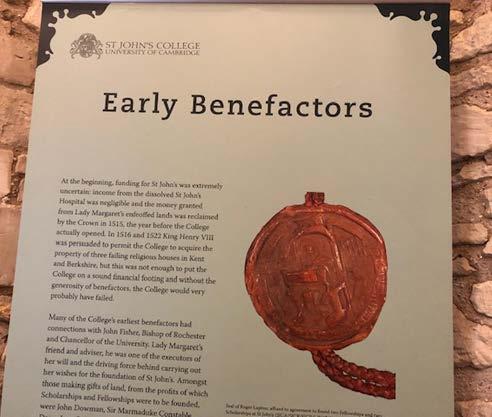
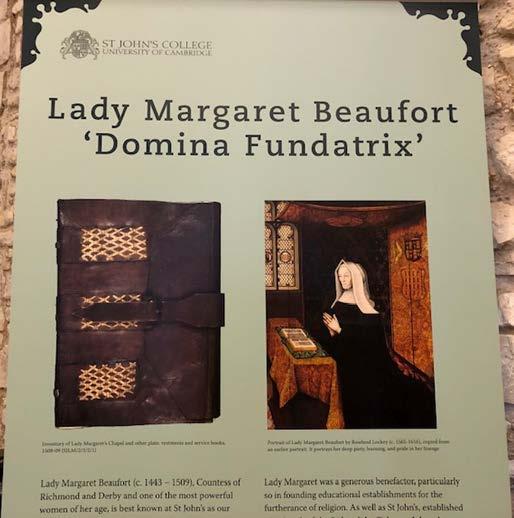 Left: SJC-SA-38 Old Boer camp wall on the summit of Hlangwane Hill near Colenso in Natal, with aloes in flower. (1905)
Kathryn McKee, Special Collections Librarian
Lynsey Darby, Archivist
Left: SJC-SA-38 Old Boer camp wall on the summit of Hlangwane Hill near Colenso in Natal, with aloes in flower. (1905)
Kathryn McKee, Special Collections Librarian
Lynsey Darby, Archivist
Diversifying the Library shelves – an update

Last term the Library launched its ‘Diversifying the Library Shelves’ project, where we asked College members for recommendations of books by scholars and authors of colour who are often missing from reading lists but who they thought should be included. We have had some powerful and thought -provoking recommendations so far, some of which have now arrived in the Library! A small selection of our new books suggested by students can be found below, along with the reasons behind their inclusion in this project.
Remnants of a Separation:
A History
of the
Partition
Through Material Memory by Aanchal Mahotra: “As the title of the book itself suggests, the book is about the stories of partition of India and Pakistan… The book contains 19 stories from across the border with the pictures of the heirlooms, where their value is not determined by their price or antiquity but by the power of an object or possession to unfold the memory of the past ”
Decolonial Ecology by Malcolm Ferdinand: “Fresh new scholarship translated into English only last year, reflecting on the very aims of the Library's diversification project ”
Black Lives in the English Archives: Imprints of the Invisible by Imtiaz Habib: “This groundbreaking piece of archival scholarship pushes back decisively against the misconception that there were no black people in England (and Britain) in the early modern period. Habib's work, which draws on a wide array of historical sources to decisively prove the significant black presence in London and elsewhere, laid the foundation for more recent works like Miranda Kaufmann's Black Tudors ”
We are still taking recommendations for this project, so please keep them com ing in! The form can be found by scanning the QR codes on the posters in the Library, or the link can be sent to you by emailing kh695@cam.ac.uk
Katie Hannawin, Library Assistant
Lifelong gratitude: reflections of a former student
Accepted at St John’s in 1955, to read Moral Sciences, I was meanwhile taking A Levels in Chemistry, Biology and English, a mixture the school timetable could not manage, so that I had no tuition for the English and simply read the texts. But I scraped a pass in all three subjects, and as there were no grade requirements, my place was safe. However, there were the two years of National Service to undertake, with the result that I arrived in Cambridge having lost what study skills and powers of concentration I might once have had, and with little notion of how to set about the English Tripos, to which I had changed on day one.
In those days there was no induction course for freshers in how to process texts, plan and fulfil assignments, or, very important, use a library. And I could not ask for help, because there was a sense you should already know how to manage your undergraduate life, and confessing you were floundering would be declaring yourself unfit to be there.
One result of this situation was that for the first year I was too scared to tackle the University Library, daunted by its scale and complexity. However, the College Library was smaller, more manageable, even cosy, and I spent many hours there, and though
the choice of texts was more limited than in the UL I was confident about finding them. The result was a lifelong sense of gratitude to the College Library, because it helped me to get into the habit of studying and supported me through a difficult time in my life.
Although my degree was modest, I left with academic aspirations, and the hope of teaching others the scholarly skills I had had to acquire unaided. The former carried me through teaching in schools, colleges and universities, an MPhil at forty and a PhD at
Meet the Library Assistant
I joined St John’s College Library in Easter term 2023, having previously worked as part of the Collections and User Services team at Cambridge University Library. Prior to my career in academic libraries, I spent eight years working as a secondary school English teacher in London and Hong Kong. I am a

fifty-two, and I was able to provide courses in ‘study skills’ along the way.
The College Library has expanded and developed enormously, but it is clear that it is user-friendly. So, I want to express my gratitude for the grounding it gave me, and to recommend any student struggling to cope with academic life to confide the difficulties to a member of the Library staff, and make use of the succour which follows.
graduate of the Faculty of Education, University of Cambridge. My Master’s thesis focused on using action research methods to examine how different approaches to pedagogy can help improve students’ understanding of A-Level English Literature. I am something of a reluctant sportsman. Having recently joined the Cambridge University Libraries cricket team, I am anticipating the forthcoming match against the Bodleian Library, Oxford, with a mixture of some excitement and trepidation. I am a keen traveller, having visited seventy-seven countries. I am also an avid theatregoer, having seen over a thousand plays (I nerdily keep a list!). I am professionally rewarded by going the extra mile to track down books for students and appreciate how lucky I am to work within such a strong, student-centred learning community as St John’s.
Find these books on the new acquisitions display




 John Crompton (1958-61)
John Crompton (1958-61)
For comments on this Issue, and contributions to future Issues, please contact Janet Chow. Email: jc614@cam.ac.uk; Tel: (3)38662
Matt Whitehead, Library Assistant





 Left: SJC-SA-38 Old Boer camp wall on the summit of Hlangwane Hill near Colenso in Natal, with aloes in flower. (1905)
Kathryn McKee, Special Collections Librarian
Lynsey Darby, Archivist
Left: SJC-SA-38 Old Boer camp wall on the summit of Hlangwane Hill near Colenso in Natal, with aloes in flower. (1905)
Kathryn McKee, Special Collections Librarian
Lynsey Darby, Archivist







 John Crompton (1958-61)
John Crompton (1958-61)